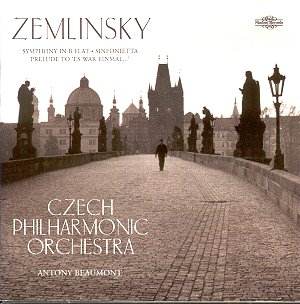Nimbus continue to strike out in pleasurably unexpected directions. True they have astutely carved out a budget box niche. Beyond this they have made sallies into Karl Weigl (the quartets) and Zemlinsky (also quartets). CPO have beaten them to a Wellesz symphony cycle; perhaps Nimbus will be first into the field with the orchestral works of Josef Marx - we can but hope.
Going by the evidence of Zemlinsky's 1897 Symphony the composer was from the same gene pool as Dvorak (symphonies 5, 6 and 7) and Bruckner (4). The Symphony is ambitious and this is self-evidently intended as a confident major statement. The composer was then only 26. By this time he had drunk deep of the symphonies of his contemporaries. The Symphony's sostenuto is truculent and as struttingly confident as Franz Schmidt's Second Symphony though surer in technique. Ländler and Furiant resound through three of the four movements. Recently I reviewed recordings of the early transitional symphonies (both un-numbered) of Otakar Ostrcil and Josef Suk and this work would be at unthreatened and unthreatening ease in their company alongside these works and those of Huber and Wetz. Mercurially slick lightning plays happily through the pages of the finale contrasted with a grave Bachian chorale. The work won the 1897 Vienna Philharmonic competition after which the composer ignored this progeny. The formulaic final flourish is stale but the work is pleasing if unassuming overall. The symphony is valedictory bidding farewell to his Brahmsian thrall in one final act of consummate immersion.
The opera Es War Einmal (once upon a time) moves us into fin-de-siècle territory. A proud decadent in music Zemlinsky served up to German audiences a series of highly spiced imaginative operas including music of silvery filigree and romance shadowing the stage works of Korngold and Schrecker. This prelude is remarkably Delian (Irmelin and Hassan) and perfume rises from it in lazy tendrils.
The Sinfonietta is a lucidly orchestrated structure of generously refulgent invention. A pointillistic tapestry of a piece it is restless and is of a quite different order of tonality to the Symphony. While far from atonal it plays fast and loose with tonality. It veers between Weill's sardonic and scorching symphonies, and the macabre charnel images of Suk's Asrael. The tempi are active and the music has an acrid sarcasm moderated only by a nostalgic sweetness. This is not the sweetness of Korngold but rather of sharp-flavoured apples and of blossom tilting into decay.
Zemlinsky was strongly associated with the Czech PO and conducted them at Vaclav Talich's invitation in Mahler 6 in 1923. He had conducted the Bohemian PO in Mahler 5 two years previously. He reciprocated by introducing Berlin audiences to Janacek's Glagolitic Mass and Lachian Dances as well as Suk's Asrael and Novak's Serenade. In 1935-37 Zemlinsky and Talich presented all the Mahler symphonies and Das Lied with the Czech PO.
When Zemlinsky emigrated to the USA and left an all too certain future behind he found himself in a country that hardly knew him. Performances of his music were not plentiful. Dimitri Mitropoulos however did him proud with three searingly intense performances of the Sinfonietta with the New York PSO. This was in the 1940/41 season. Within a year the composer was dead.
I wondered how successful these recordings would be. After all Antony Beaumont is an academic and the world can be unforgiving of people straying from their 'last'. In fact this disc sounds and scans well with no shortcomings interpretatively speaking - a case of music illuminated by a lifetime of study. I have hopes that there will be other discs from this source, from Beaumont and the Czechs. My fingers are also crossed that Beaumont or Christopher Walton (the Schoeck expert) will make a foray into Josef Marx's orchestral music delivering up two scores of clamant virtue: Eine Herbstsymphonie and Naturtrilogie.
Beaumont, himself a Zemlinsky expert and immersed in the era and locale, contributes the programme notes. They are in an easily legible font and are in English only as is Nimbus's habit.
The Czech PO are polished and have the necessary élan for this music. The tone of their string section is, by a shading, not as voluptuous as the music demands. Predictably their woodwind are everything you could wish for.
Rob Barnett

